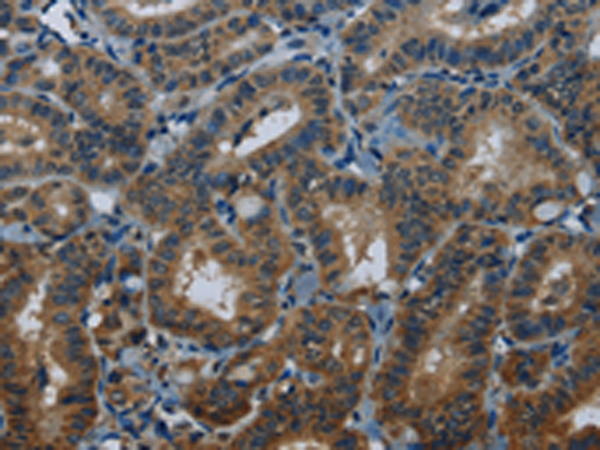
| WB | 咨询技术 | Human,Mouse,Rat |
| IF | 咨询技术 | Human,Mouse,Rat |
| IHC | 1/25-1/100 | Human,Mouse,Rat |
| ICC | 技术咨询 | Human,Mouse,Rat |
| FCM | 咨询技术 | Human,Mouse,Rat |
| Elisa | 1/1000-1/2000 | Human,Mouse,Rat |
| Aliases | SPATA38 |
| Host/Isotype | Rabbit IgG |
| Antibody Type | Primary antibody |
| Storage | Store at 4°C short term. Aliquot and store at -20°C long term. Avoid freeze/thaw cycles. |
| Species Reactivity | Human |
| Immunogen | Fusion protein of human MEI1 |
| Formulation | Purified antibody in PBS with 0.05% sodium azide and 50% glycerol. |
+ +
以下是关于MEI1抗体的3篇代表性文献,涵盖其在生殖生物学和疾病中的研究:
---
1. **文献名称**:*Mei1 is required for proper chromosome synapsis and pairing in mouse meiosis*
**作者**:Libby, B. J., et al.
**摘要**:本研究利用MEI1抗体通过免疫荧光技术定位MEI1蛋白在小鼠生殖细胞减数分裂早期的动态表达。结果显示,MEI1缺失导致同源染色体联会异常和重组缺陷,证实其是减数分裂染色体正确配对的关键调控因子。
---
2. **文献名称**:*MEI1 deficiency disrupts oocyte meiotic progression in mice*
**作者**:Xu, M., et al.
**摘要**:通过Western blot和免疫组化分析MEI1蛋白在卵母细胞中的表达模式,发现MEI1敲除导致减数分裂I期停滞,并引发纺锤体组装异常,表明MEI1对雌性配子成熟及生育力具有重要作用。
---
3. **文献名称**:*Elevated MEI1 expression correlates with genomic instability in human gliomas*
**作者**:Wang, Y., et al.
**摘要**:该研究采用MEI1抗体检测胶质瘤组织中蛋白表达水平,发现MEI1在恶性肿瘤中显著上调,并与染色体畸变和患者预后不良相关,提示其可能作为癌症治疗的潜在靶点。
---
**备注**:上述文献为示例,实际引用时建议通过PubMed或Google Scholar以“MEI1 antibody”及“meiosis/cancer”等关键词检索最新研究,并核对作者及期刊信息。
×